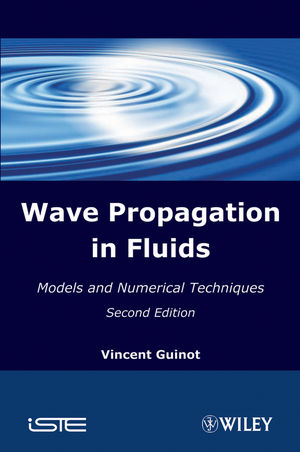Wave Propagation in Fluids: Models and Numerical Techniques, 2nd EditionISBN: 978-1-84821-213-8
Hardcover
560 pages
October 2010, Wiley-ISTE
 |
||||||
Introduction xv
Chapter 1. Scalar Hyperbolic Conservation Laws in One Dimension of Space 1
1.1. Definitions 1
1.2. Determination of the solution 9
1.3. A linear law: the advection equation 14
1.4. A convex law: the inviscid Burgers equation 21
1.5. Another convex law: the kinematic wave for free-surface hydraulics 28
1.6. A non-convex conservation law: the Buckley-Leverett equation 35
1.7. Advection with adsorption/desorption 42
1.8. Summary of Chapter 1 47
Chapter 2. Hyperbolic Systems of Conservation Laws in One Dimension of Space 53
2.1. Definitions 53
2.2. Determination of the solution 59
2.3. A particular case: compressible flows 63
2.4. A linear 2×2 system: the water hammer equations 68
2.5. A nonlinear 2×2 system: the Saint Venant equations 84
2.6. A nonlinear 3×3 system: the Euler equations 108
2.7. Summary of Chapter 2 122
Chapter 3. Weak Solutions and their Properties 131
3.1. Appearance of discontinuous solutions 131
3.2. Classification of waves 138
3.3. Simple waves 142
3.4. Weak solutions and their properties 144
3.5. Summary 157
Chapter 4. The Riemann Problem 161
4.1. Definitions – solution properties 161
4.2. Solution for scalar conservation laws 165
4.3. Solution for hyperbolic systems of conservation laws 173
4.4. Summary 189
Chapter 5. Multidimensional Hyperbolic Systems 193
5.1. Definitions 193
5.2. Derivation from conservation principles 197
5.3. Solution properties 200
5.4. Application: the two-dimensional shallow water equations 208
5.5. Summary 221
Chapter 6. Finite Difference Methods for Hyperbolic Systems 223
6.1. Discretization of time and space 223
6.2. The method of characteristics (MOC) 227
6.3. Upwind schemes for scalar laws 244
6.4. The Preissmann scheme 250
6.5. Centered schemes 260
6.6. TVD schemes 263
6.7. The flux splitting technique 271
6.8. Conservative discretizations: Roe’s matrix 280
6.9. Multidimensional problems 284
6.10. Summary 289
Chapter 7. Finite Volume Methods for Hyperbolic Systems 293
7.1. Principle 293
7.2. Godunov’s scheme 299
7.3. Higher-order Godunov-type schemes 313
7.4. EVR approach 319
7.5. Summary 326
Chapter 8. Finite Element Methods for Hyperbolic Systems 329
8.1. Principle for one-dimensional scalar laws 329
8.2. One-dimensional hyperbolic systems 340
8.3. Extension to multidimensional problems 344
8.4. Discontinuous Galerkin techniques 347
8.5. Application examples 354
8.6. Summary 368
Chapter 9. Treatment of Source Terms 371
9.1. Introduction 371
9.2. Problem position 372
9.3. Source term upwinding techniques 377
9.4. The quasi-steady wave algorithm 386
9.5. Balancing techniques 390
9.6. Computational example 403
9.7. Summary 408
Chapter 10. Sensitivity Equations for Hyperbolic Systems 411
10.1. Introduction 411
10.2. Forward sensitivity equations for scalar laws 413
10.3. Forward sensitivity equations for hyperbolic systems 422
10.4. Adjoint sensitivity equations 435
10.5. Finite volume solution of the forward sensitivity equations 441
10.6. Summary 447
Chapter 11. Modeling in Practice 449
11.1. Modeling software 449
11.2. Mesh quality 454
11.3. Boundary conditions 459
11.4. Numerical parameters 464
11.5. Simplifications in the governing equations 466
11.6. Numerical solution assessment 472
11.7. Getting started with a simulation package 477
Appendix A. Linear Algebra 479
Appendix B. Numerical Analysis 487
Appendix C. Approximate Riemann Solvers 505
Appendix D. Summary of the Formulae 521
Bibliography 527
Index 537



